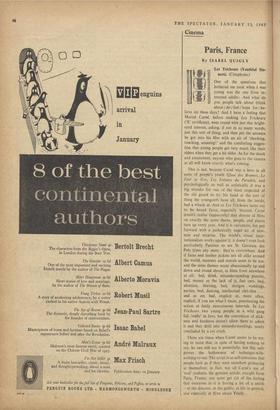Cinema
Paris, France
By ISABEL QUIGLY
ONE of the questions that bothered me most when I was young was the one from in- terested adults: And what do
0 you people talk about (think
about / do / feel / hope for! be- lieve in) these days? And I have a feeling that Marcel Carrie, before making Les Tricheurs ('X' certificate), went round with just that bright- eyed interest, asking, if not in so many words, just this sort of thing; and then put the answers he got into his film with an air of 'shocking, touching, amazing!' and the comforting sugges- tion that young people get very much like their elders when they get a bit older. As for the shock and amazement, anyone who goes to the cinema at all will know exactly what's coming.
This is sad, because Carrie was a hero in all sorts of people's youth (Quai des Brumes, Le Jour se !eve, Les Enfants. di, Paradis), and psychologically as well as artistically it was a big mistake for one of the most respected of the old guard to try his hand at the sort of thing the youngsters have all, from the inside, had a whack at. And so Les Tricheurs turns out to be broad farce, especially because Came doesn't realise (apparently) that dozens of films on exactly the same theme, people, and places turn up every year. And it is caricature, but put forward with a pathetically eager air of new- ness and surprise. The world's. visual inter- nationalism works against it; it doesn't even look particularly Parisian to see St. Germain des Pres types any more : they're everywhere. And if faces and leather jackets arc all alike around the world, manners and morals seem to be too, and the same themes occur obsessionally up and down and round about, in films from anywhere at all: bed, drink, misunderstanding parents, bed, money or the lack of it, fast cars, bed, abortion, thieving, bed, shotgun weddings, parties, bed, dancing, intellectual chit-chat . . and so on; bed, implicit or, more often, explicit, if you see what I mean, punctuating the action at fairly monotonous intervals. In Les Tricheurs two young people in a wild gang fall 'really' in love, but the convention of slick- ness and hardness doesn't allow them to admit it and they drift into misunderstandings, neatly concluded by a car crash.
There are times when Carne seems to be try- ing to insist that, in spite of having nothing to say, he can still say it powerfully, but this only proves the hollowness of technique-with- nothing-to-say. The script is so self-conscious that people look as if they were somehow grimacing at themselves; in fact, not all Carne's use of 'real' students, the genuine article, straight from Paris, France, can quite get rid of the feeling that everyone in it is having a bit of a smirk --at the director, at the public, at life in general, and especially at films about Youth.


































 Previous page
Previous page